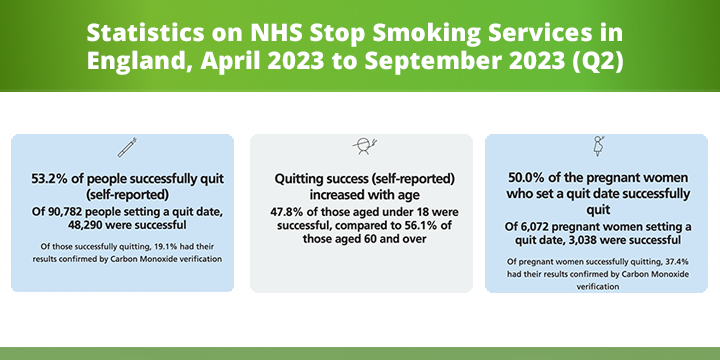Last fact-checked 27 February 2024 | Report a factual error on this article
If you’re trying to quit smoking, your local Stop Smoking Service gives you the best chances of success. You're 3 times more likely to quit successfully with the help of a Stop Smoking counsellor (source: Public Health England). It's also a completely free service, available through the NHS.
This week, we’ll take a closer look at the role of a smoking cessation counsellor. We’ll explain who these people are, how they’re trained and why they're such a vital piece of the quitting puzzle here in the UK.
About the NHS Stop Smoking Service
Funded and operated by the NHS, the Stop Smoking Service gives tobacco quitters access to one-to-one support from a trained smoking cessation counsellor in their area. The Stop Smoking Service is completely free to use and helps tens of thousands of Brits to kick the smoking habit every month.
Your chances of quitting with help from the NHS
The Stop Smoking Service doesn’t guarantee that you’ll be able to quit cigarettes successfully, but it gives you the best possible chance of doing so. The odds of successfully quitting ‘cold turkey’ (also known as 'unassisted quitting') are around 3% to 4% (source: Public Health England), while the odds of quitting with the help of the NHS are much much higher.

Recent statistics show that success rates for the NHS Stop Smoking service is around 50%. In fact, it has been almost exactly 50% every year for the past decade (source: digital.nhs.uk). Where possible, these statistics are verified with carbon monoxide tests (the NHS can tell if someone has smoked a cigarette recently by measuring the amount of carbon monoxide in their body).
The table below shows the success rates for NHS Stop Smoking services in England from 2010 to 2020:

When you’re quitting, it helps to get help. ... and the stats above prove it.
NHS Stop Smoking Counsellors: who they are
NHS counsellors come from all walks of life. Some are ex-smokers, while others have never smoked a cigarette in their lives. NHS counsellors don’t have to have any prior experience in counselling or psychotherapy to qualify: they just need to receive specialist training on techniques proven to help smokers quit.
Many counsellors started out working for the NHS in another capacity, then trained up as smoking cessation specialists. They work all over the country, providing a free local service to quitters. Normally, they work on a face-to-face basis, but they can also work over-the-phone and online.
What Training Do NHS Stop Smoking Counsellors Have?
Most NHS Stop Smoking counsellors in the UK are accredited by the National Centre for Smoking Cessation and Training (NCSCT). NCSCT-taught smoking cessation counsellors are incredibly effective — one reason for this is that the training programme they follow is based exclusively on techniques and methods that have been proven to work (source: ncsct.co.uk). Questionable techniques (hypnotherapy, for instance) are completely ignored by the NCSCT unless there’s sufficient evidence that it actually helps smokers to quit.
The best way to quit is with professional help
We hope this article has given you a bit of an idea as to why the NHS Stop Smoking Service works so well. If you’re trying to make this year the year you quit, then pick up the phone to your local NHS Stop Smoking Counsellor today. These counsellors are experts, and you deserve to give yourself the very best possible chance of success!
Stay safe and happy vaping!
John Boughey

